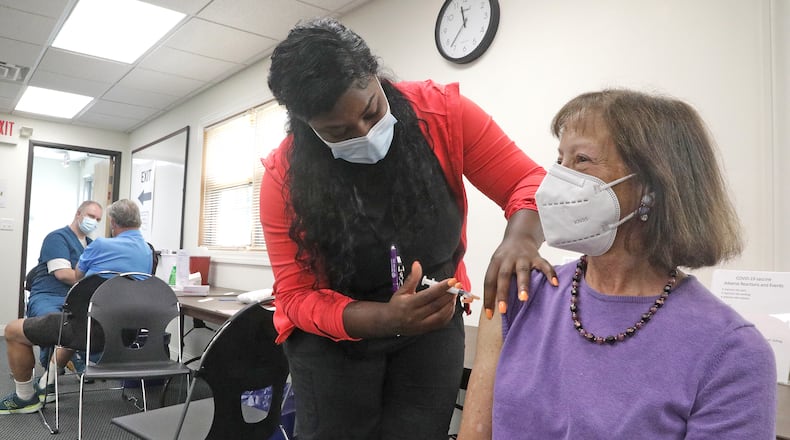“This protection from the vaccination does wear off over time,” said Dr. Becky Thomas, medical director for Public Health - Dayton and Montgomery County.
The Dayton Daily News reviewed the Kaiser Family Foundation’s analysis of Centers for Disease Control data, which showed a yearlong trend. Fewer than three in 10 adults dying from COVID-19 in the fall of 2021 were vaccinated or boosted, but that rose to six out of 10 by August 2022, the most recent data available.
From September to December of 2021, between 77% and 70% of the COVID-related deaths were among unvaccinated individuals. In January 2022, approximately 59% of COVID-related deaths were among unvaccinated individuals. It was 29% among those who had their primary vaccination series and 12% who had both their primary vaccinations and booster shots.
By April 2022, COVID-related deaths appeared to have flipped to taking place mostly among individuals who were vaccinated. In April, only 41% of deaths were among unvaccinated individuals, while 23% were people who received their primary series and 36% were vaccinated and had an early form of booster shot. These trends continued in the data analyzed by the Kaiser Family Foundation through August, which was the last month of available data.
In Ohio, there have been approximately 27,307 deaths related to COVID-19 between Jan. 1, 2021, and Dec. 29, 2022, according to the Ohio Department of Health. Of those deaths, 25,854 have been among individuals not reported as fully vaccinated and 1,453 among fully vaccinated individuals.
There also have been 89,624 Ohio COVID hospitalizations between January 2021 and now, which include 83,393 among individuals not fully vaccinated and 6,231 among fully vaccinated individuals, according to ODH.
One reason vaccinated individuals are now making up more of the COVID-19 related deaths is because they now make up the majority of the population, or 79%, the Kaiser Family Foundation said. Additionally, no vaccine is 100% effective, and the immunity the primary vaccination series provided at the beginning of their availability in spring of 2021 has decreased due to new variants in circulation.
For some, the last time they got a COVID shot was over a year ago. Updated (bivalent) booster shots became widely available in September, and uptake on those vaccinations has been slow nationally and statewide. Approximately 14.6% of people over the age of five have had a dose of the updated booster, according to the CDC. The new booster shots more directly target the strains of COVID that are in circulation now.
Thomas said research has shown one of the main reasons behind the slow utilization of the new booster shots is related to a lower perception of risk.
“They don’t see the point of getting another COVID shot,” Thomas said.
While doctors have more therapeutic options available to help treat patients with COVID, public health experts say now is not the time to fall behind. They say it is still important to keep up with steps like vaccinations and booster shots to provide additional protection.
“Unfortunately, we’re still seeing more than 2,500 people dying each week (nationally from COVID-19),” Thomas said. “We’re not done with the pandemic.”
Thomas said people who are vaccinated with the updated booster are 18 times less likely to die from the virus and three times less likely to test positive. Additional research is showing the bivalent boosters are also contributing to a decreased risk of hospitalizations, she said.
“Staying up to date with those vaccines has to be a priority,” Thomas said.
The Clark County Combined Health District said residents’ use of the new booster shots is consistent with state and national trends, but a steady flow of individuals are still taking advantage of the vaccine clinics they hold four to five times a week.
“We want to make them available as we can,” said Nate Smith, communications coordinator with the health district. “We continue to look for ways to educate and inform our residents.”
There also are concerns rising for potential future variants. Thomas said Public Health is watching what is happening with China relaxing its COVID restrictions and rolling back its zero-COVID policy.
“The virus is spreading rapidly,” Thomas said. “With every new infection, there’s a chance for the virus to mutate.”
Because of the rising COVID cases in China, new COVID tests for travelers are being imposed. The CDC announced this week it will implement a requirement for a negative COVID-19 test or documentation of recovery for air passengers boarding flights to the U.S. originating from China, Hong Kong and Macau.
The CDC said this step is meant to slow the spread of COVID-19 in the U.S. during the surge in China, saying there is a lack of adequate and transparent epidemiological and viral genomic sequence data being reported from China. These data are critical to monitoring the case surge effectively and decrease the chance for entry of a novel variant of concern, the CDC said.
To find vaccines near you, visit www.vaccines.gov.
About the Author

